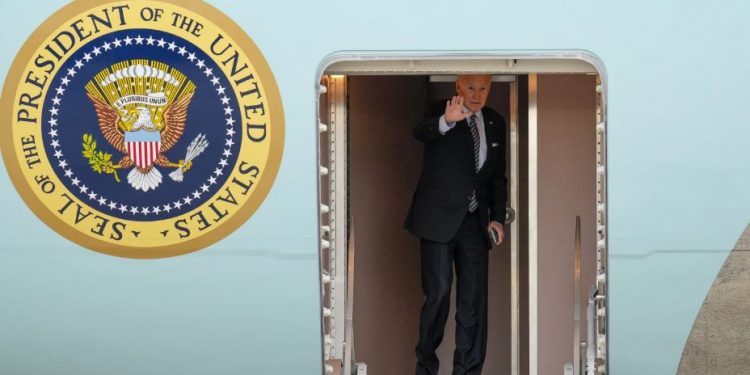Jerusalem: US President Joe Biden plans to ask Israeli Prime Minister Benjamin Netanyahu some “tough questions as a friend of Israel” regarding Jerusalem’s strategy in the Gaza war, White House National Security Council Spokesperson John Kirby told reporters aboard Air Force One with the President enroute to Tel Aviv, media reports said.
He is slated to land at the Ben Gurion Airport near Tel Aviv at 10 am for meetings with Israeli officials, The Times of Israel reported.
Biden’s visit will be building off of a passionate speech last week in which he expressed his horror over the brutal Hamas assault, winning over Israelis across the political spectrum.
But this trip faltered before it began following an explosion Tuesday evening at a Gaza hospital that Hamas has blamed on Israeli airstrikes.
Israel said it was not involved and said a rocket misfired by Palestinian Islamic Jihad led to the blast that killed hundreds, The Times of Israel reported.
Biden’s Jordan leg of the trip where he was supposed to meet in a four-way summit with Palestinian Authority President Mahmoud Abbas, Jordanian King Abdullah II and Egypt’s President Abdel Fattah El Sisi was called off following the explosion, and widespread condemnation in the Arab world.
In Israel, Kirby said that Biden will meet with the families of people killed in Hamas’s brutal massacre in Israel October 7, and of people who were abducted by the terror group. The shock Hamas onslaught killed nearly 1,300 people, mostly civilians, and some 200 people of all ages were taken captive.
Kirby added that in discussions with Israeli leaders, Biden will also discuss humanitarian aid to Gaza, which Washington has been pushing.
Israel has largely held off on allowing humanitarian aid into Gaza, as it seeks to pressure Hamas to release hostages.
Washington has also been pressing Israel to flesh out its strategy for Wednesday after it completes its stated war goal of toppling Hamas.
Ayman Safadi, Jordan’s foreign minister, told a state-run television network that the war is “pushing the region to the brink.”
There are also fears that a new front could erupt along Israel’s northern border with Lebanon, where Hezbollah operates. The Iran-backed organisation has been skirmishing with Israeli forces.
Always a believer in the power of personal diplomacy, Biden’s trip will test the limits of US influence in the Middle East at a volatile time. It’s his second trip to a conflict zone this year, after visiting Ukraine in February to show solidarity with the country as it battles a Russian invasion.
Mediators have been struggling to break a deadlock over providing supplies to desperate civilians, aid groups and hospitals.
US Secretary of State Antony Blinken, bouncing back and forth between Arab and Israeli leadership ahead of Biden’s visit, spent seven and a half hours meeting Monday in Tel Aviv in an effort to broker some kind of aid agreement and emerged with a green light to develop a plan on how aid can enter Gaza and be distributed to civilians.
“We’re optimistic that we’ll be able to get some humanitarian assistance in,” Kirby said.
Although only a modest accomplishment on the surface, US officials stressed that Blinken’s talks led to a significant change in Israel’s position going in — that Gaza would remain cut off from fuel, electricity, water and other essential supplies.
US officials said it has become clear that already limited Arab tolerance of Israel’s military operations would evaporate entirely if conditions in Gaza worsened.
Their analysis projected that outright condemnation of Israel by Arab leaders would not only be a boon to Hamas but would likely encourage Iran to step up its anti-Israel activity, adding to fears that a regional conflagration might erupt, according to four officials who spoke to The Associated Press on condition of anonymity to discuss internal administration thinking.
Agencies







































